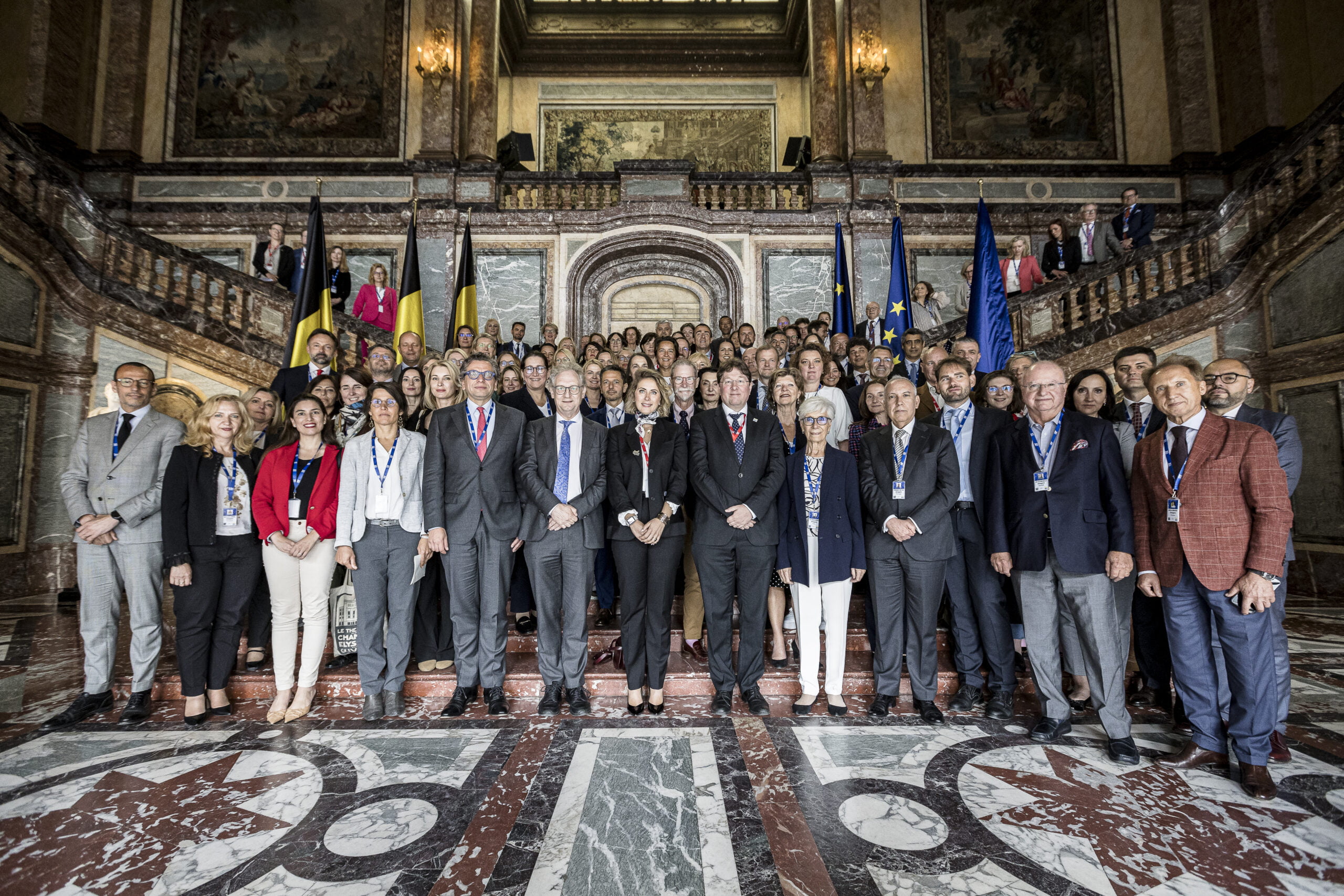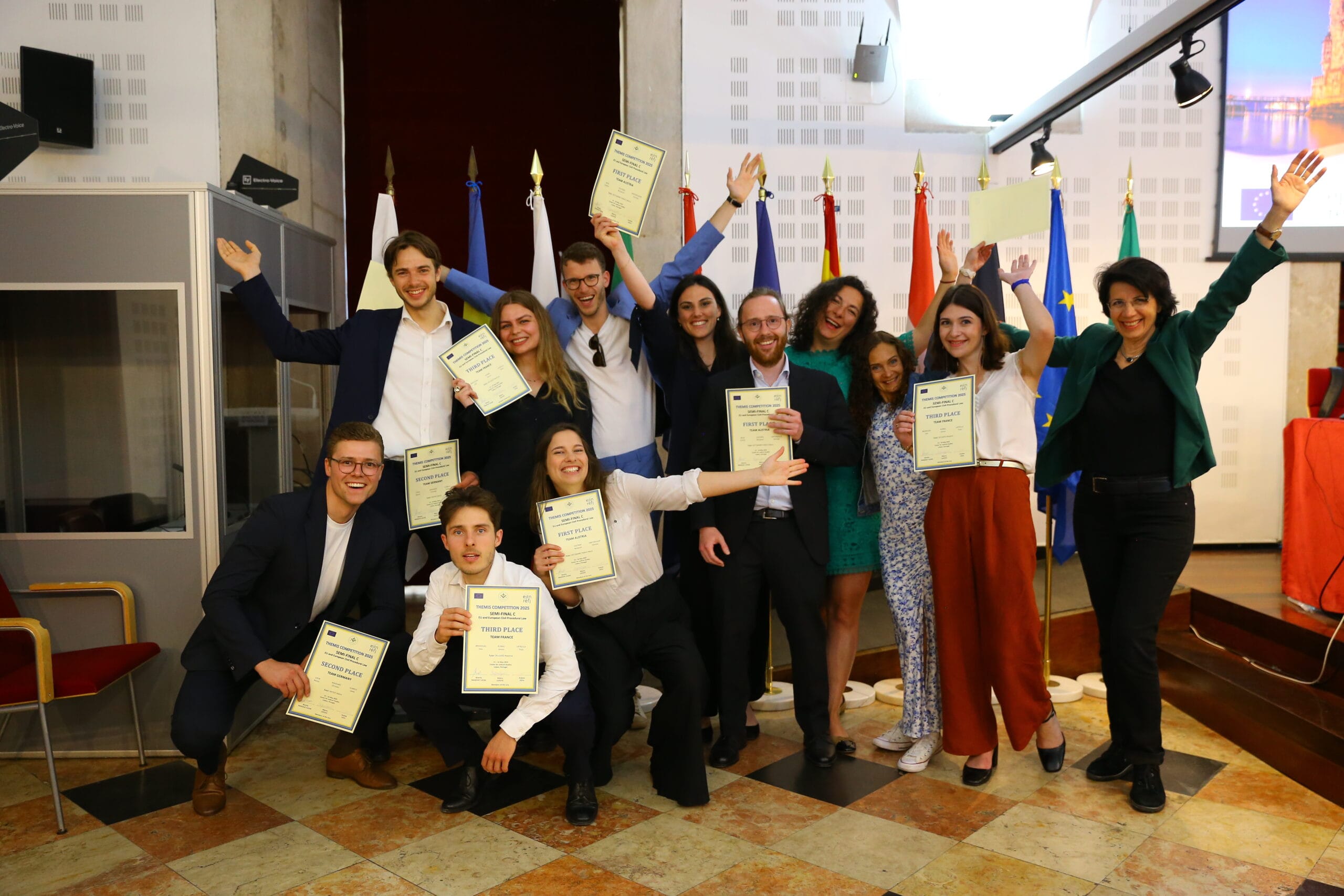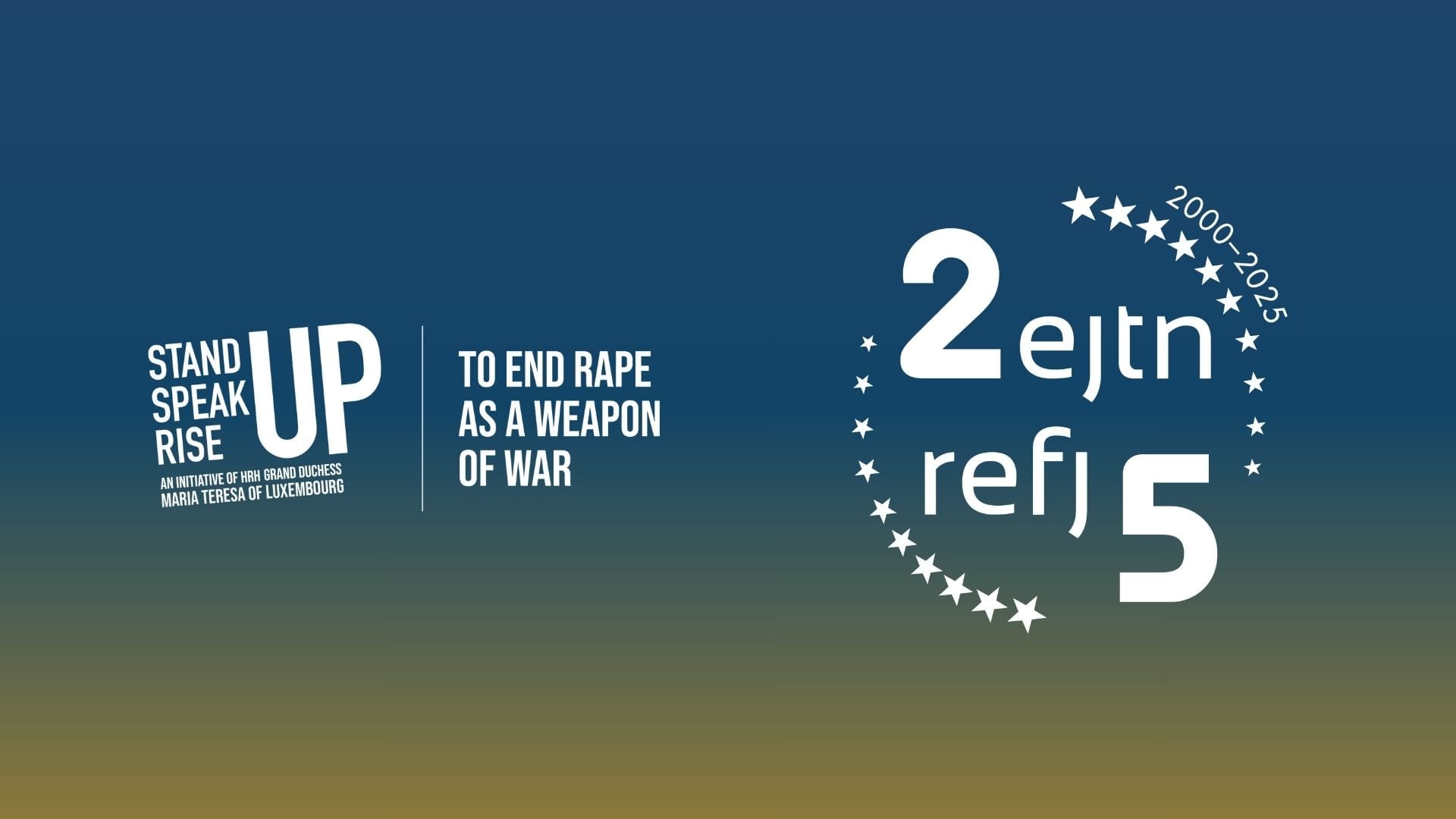On 12 and 13 June, EJTN organised its 2024 Extraordinary General Assembly under the Belgian Presidency of the Council of the European Union and with support from the Belgian Judicial Training Institute. The event took place in Brussels, Belgium.
Over 100 delegates, including most of the directors of the judicial training institutions across the European Union and representing EJTN Members, Associate Members, Observers and Partners attended the General Assembly. A series of speeches, presentations, keynotes and workshops provided the delegates with a complete overview of EJTN’s ongoing activities as well as a summary of the recent accomplishments. The event was also an opportunity to work on the progress towards the Network’s overall strategic goals. The delegates discussed key topics which will shape the Network’s future, covering themes such as a Green Deal policy for EJTN, establishing EJTN’s ethical principles, and how better support and train the leaders.
Updating the Network of last year’s accomplishments
During the Extraordinary General Assembly, the EJTN Secretary General Ingrid Derveaux gave a report on the 2023 activities focusing on the key achievements of the year, such as the new Memorandum of Understanding with the EPPO, launch of new study visits, the increase in the number of participants and the release of the new Catalogue of Training Activities. Moreover, Ms Derveaux highlighted the further consolidation of strategic partnerships, such as the excellent cooperation and the continued increase in the number of participants of study visits at the Court of Justice of the European Union. The Secretary General also underlined the work already accomplished by EJTN on digitalisation, and shared plans for the organisation’s medium- and long-term priorities and the latest relevant updates.
Remco Van Tooren, Chair of the EJTN Steering Committee, also delivered a report on the Steering Committee’s activities during 2023. He underlined the close collaboration within the Steering Committee and its specific working groups, demonstrated through a high number of meetings that took place last year, both online and in a hybrid format. Mr Van Tooren also highlighted the work on a new partnership strategy, which will help the Network to be even more effective with its numerous collaborations and cooperations with key institutions and organisations.
EJTN’s five Working Groups (Exchange, Programmes, Judicial Training Methods, Linguistics and Digitalisation) shared an overview of their accomplishments in 2023 as well as highlighted their plans for the future. Special projects conducted in collaboration with the Directorate-General for Neighbourhood and Enlargement Negotiations (DG NEAR) and the Directorate-General for Competition (DG COMP) were also highlighted, preceded by an intervention by Giulio Venneri of DG NEAR.
Administrative matters, such as the planning of 2025 activities, were also covered during the General Assembly.
The 2023 Judges@Europe publication was launched during the event. Edited by Stanislas Adam, Ingrid Derveaux, Gianluca Grasso and Fernando Vaz Ventura, with a foreword by Síofra O’Leary, and published by Larcier Intersentia, the publication focuses on the rule of law and good administration of justice in the digital era.
The EJTN 2023 Annual Report was also made available to the participants.
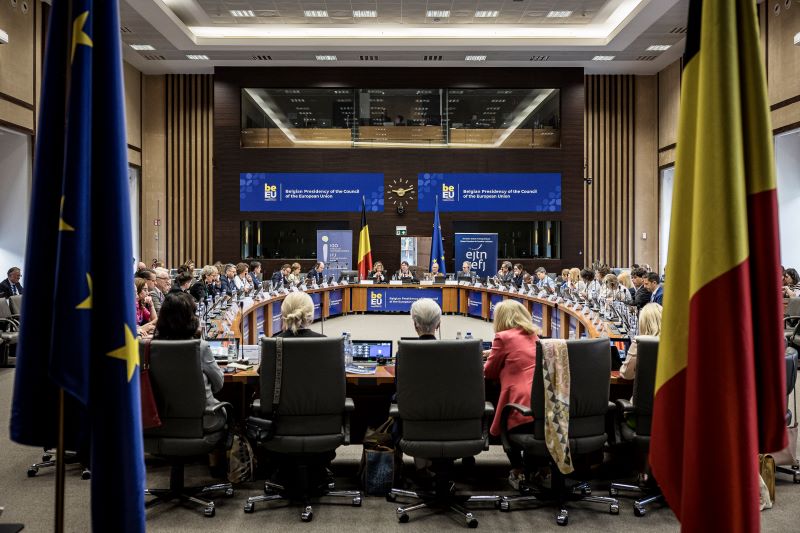
Fostering dialogue with key judicial training stakeholders
The representatives from key organisations and institutions, such as the European Court of Justice, the European Commission, Eurojust, the Network of the Presidents of the Supreme Judicial Courts of the European Union, the Council of Europe, the European Union Agency for Asylum (EUAA), the European Judicial Network (EJN) and the European Judges Group for Mediation (GEMME) interacted with the delegates and had the chance to have a look into future training needs of judges, prosecutors and court staff across the EU, as well as discuss fostering cooperation with the Network.
In her intervention, EJTN Secretary General Ingrid Derveaux highlighted the opportunities ahead for the Network:
“During this Extraordinary General Assembly, we showed our Partners our creativity and the richness of our activities. I am proud of our Network and of being able to share these results with our Partners. Thank you for your support.
We used these two days for discussions which allow the Network to become stronger. We advanced together. During this assembly, we were able to confirm that the Network’s direction should continue on being greener and agreed on the need to establish ethical principles for the European Judicial Training Network.
EJTN is like an orchestra, which is able to show its value thanks to the work of everyone. I want to thank each member and each of you for your ideas you bring to the Network.”

In her keynote speech, Ana Gallego, Director-General of Directorate-General for Justice and Consumers (DG JUST), underlined the importance of fostering environments that enable positive change as well as outlined her hopes for EJTN’s deliverables in the coming years:
“To enable and further facilitate the digital transformation of justice systems, we need to create a supportive environment. A new European Judicial Training Strategy focussing on digitalisation of justice could be put in place as of 2025. EJTN has been and, as we hope, will continue to be an important and strategic partner for us. With our support to EJTN, we aim in the years to come to create a leverage effect on the judicial trainings offered at national level. Actions of the Network will be expected to create a concrete, measurable rollout effect and the role of EJTN Members will be crucial to achieve this.”

In his speech, Stanislas Adam, Legal Secretary at the Court of Justice of the European Union, highlighted the important cooperation between the CJEU and EJTN, which has lasted for more than 15 years:
“The ‘ever-closer union among the peoples of Europe’ that the EU strives to achieve would be unconceivable without a coherent and stable EU legal order, for which the Court of Justice bears ultimate responsibility. Dialogue and cooperation with the national courts are essential to enable the Court to fulfil that mission. It is against that background that the Court has started to cooperate with the EJTN more than 15 years ago. A cooperation based on the 2016 Memorandum of Understanding, which has gradually transformed into a genuine partnership. To mark its commitment to that partnership, the Court adopted in 2023 a Declaration entitled ‘Supporting the European Judicial Training Network’ to shape a sustainable European judicial culture’. That declaration, which can be easily accessed on the Curia website, confirms the Court’s full support to the EJTN as a trustful and legitimate partner to foster ‘mutual trust’ in the national justice systems through judicial training.
The Court of Justice and the EJTN indeed pursue converging objectives. The EJTN is the main platform among the European judiciary for knowledge exchange in a wide range of areas, in particular EU law. It has been organising cross-border training activities for national justice professionals for over two decades, thus helping to improve knowledge of EU law, including key instruments of judicial cooperation such as the European Arrest Warrant. The EJTN therefore operates as a ‘transmission belt’ between the Court of Justice and national judges and prosecutors regarding EU law and EU Courts’ case-law. Our joint activities and projects have never been so numerous and ambitious as last year, and precisely aim to support the EJTN in that essential role. In the Court’s own words in the declaration that I have just mentioned, that cooperation also ‘contributes to the development of a genuine European judicial culture and to a healthy esprit de corps among European judges, at both EU and national level’.”
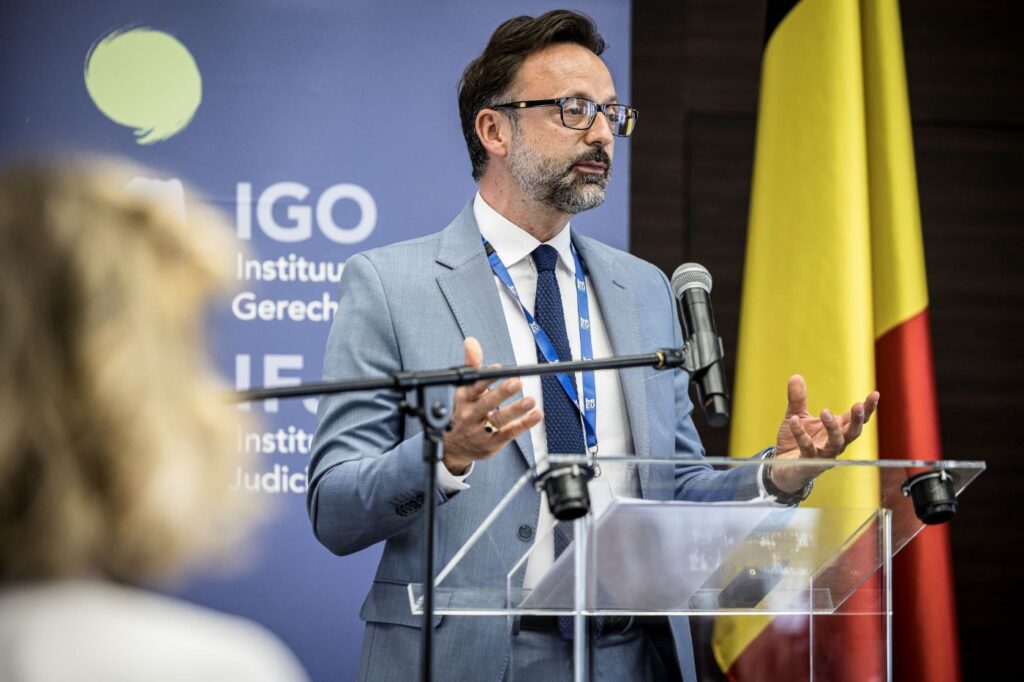
Raf van Raansbeeck, Director of the Belgian Judicial Training Institute, expressed his appreciation for the significance of an event such as the General Assembly in bringing together all parts of the Network to develop future projects and initiatives:
“A General Assembly is always an important event for every organisation. It is during such occasion that the directors and representatives of the various Members and Associate Members of our network can meet, and where the ties with Partners, Observers and European and international bodies can be strengthened. Furthermore, it is also the moment to get a full overview of the balance of the previous operating year, and to take important decisions on EJTN’s future and to discuss about how certain problems will be tackled in order to improve the overall functioning of the Network. In short, it is the occasion par excellence where the Members and Associated Members are central. As the host country of this year’s EJTN Extraordinary General Assembly, we are very honoured to have been able to support and make it a successful event together.”
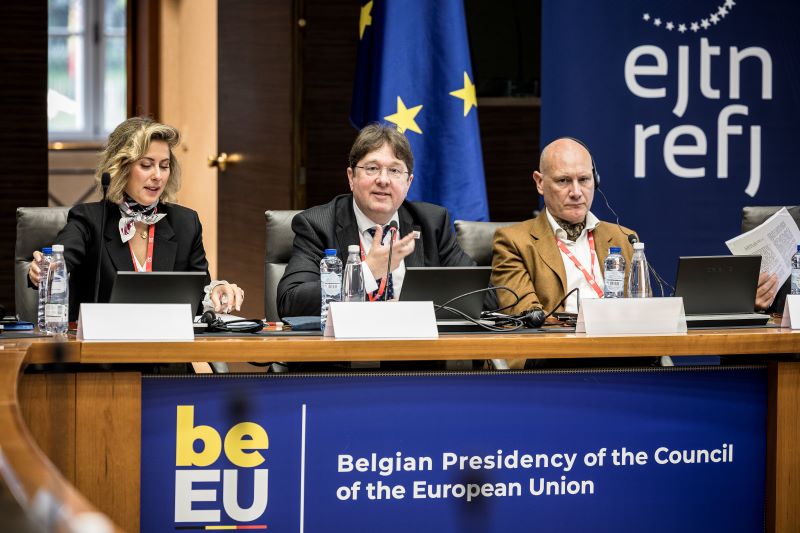
Looking to the future
The General Assembly was also the place to plan and look into the future. The next EJTN Directors’ Conference will take place under the future Hungarian Presidency of the Council of the European Union. The 2025 General Assembly will be hosted under the future Polish Presidency of the Council of the European Union. Next year also marks the 25th anniversary of EJTN, which will be celebrated on suitable occasions throughout the year.
***
EJTN wants to thank the Director of the Belgian Judicial Training Institute Raf van Ransbeeck, his deputy director Charles-Eric Clesse and his team for their professionalism and dedication in the organisation and delivery of this year’s Extraordinary General Assembly.

